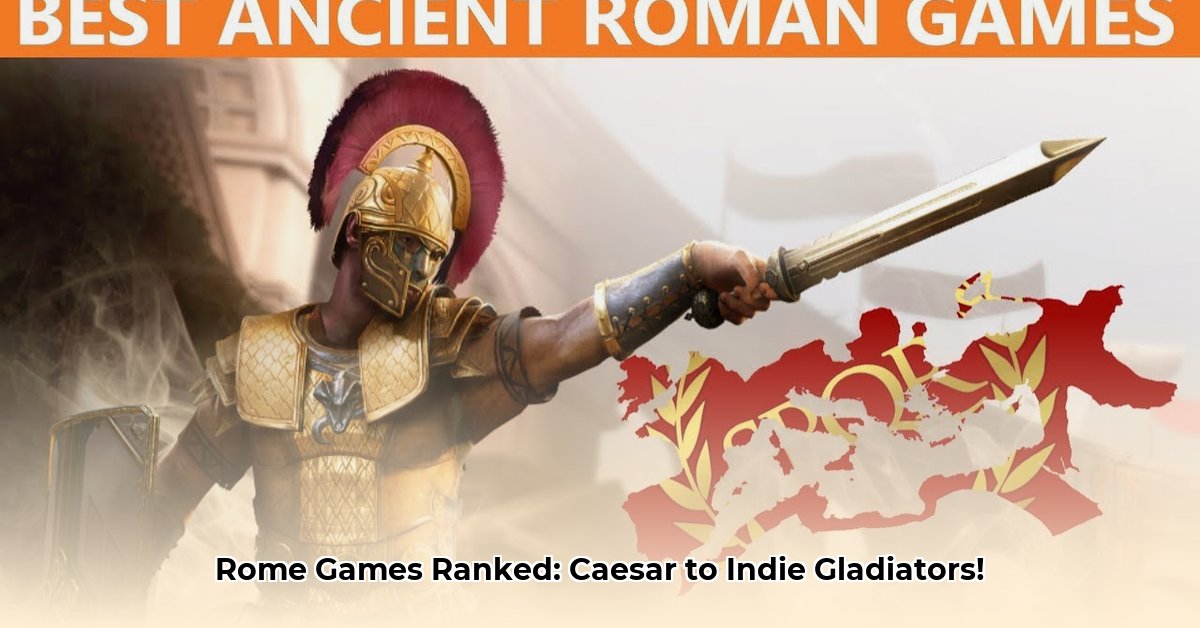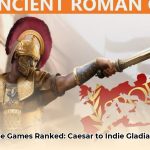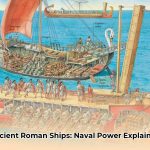For millennia, the allure of Ancient Rome has captured the human imagination. From the tactical brilliance of its legions to the political machinations of its emperors and the brutal spectacle of its arenas, Rome’s legacy is ripe for exploration. Indeed, you can learn about the evolution of the Roman Soldier’s Helmet. In the digital realm, this fascination transforms into immersive experiences, offering gamers unparalleled opportunities to command vast empires, construct magnificent cities, or fight for survival as a gladiator. This premium guide offers a definitive, ranked list of the best Ancient Rome games available in 2024, spotlighting titles from the strategic depth of Total War to the visceral action of Ryse: Son of Rome and the surprising narrative power of indie gems. Prepare to delve into strategic triumphs, rich historical narratives, and challenging combat, as we reveal the digital empires worth conquering.
The Best Ancient Rome Games, Ranked for 2024
Ready to experience the thrill of commanding legions, constructing magnificent empires, or fighting for your life as a gladiator? Dive into the captivating world of ancient Rome games! We’ve meticulously evaluated the top digital recreations of this iconic era, ranking them based on their historical immersion, gameplay innovation, engagement, and enduring appeal.
1. Total War: Rome II
Developer: Creative Assembly
Release Year: 2013 (actively updated)
Platforms: PC, macOS, Linux
Total War: Rome II stands as the quintessential grand strategy experience for any Roman enthusiast. This title masterfully blends turn-based empire management with real-time tactical battles on a breathtaking scale. Players assume control of various factions, including the powerful Roman families, and guide them through a meticulously detailed map spanning from Britannia to Egypt. The game’s deep political and economic systems, combined with its stunning battle visuals—showcasing thousands of individual soldiers clashing—provide an unparalleled sense of historical scope. Regular updates and expansions keep the experience fresh, making it the top choice for aspiring strategists aiming to forge or dismantle an empire. Its vast modding community further extends its replayability, adding countless hours of new content and strategic possibilities.
2. Expeditions: Rome
Developer: Logic Artists
Release Year: 2022
Platforms: PC
Expeditions: Rome offers a compelling blend of tactical turn-based combat and deep role-playing, making it a standout in the Roman RPG genre. Players step into the sandals of a young Legatus, exiled from Rome, who must carve their path through military campaigns across Greece, Egypt, and Gaul. The game excels in its narrative choices, allowing players to shape their character’s personality and influence the story through their decisions. From managing your legion and developing your camp to engaging in intricate, grid-based battles, Expeditions: Rome delivers a mature storyline filled with political intrigue, personal drama, and a genuinely engaging cast of companions. Its branching quests and multiple endings ensure significant replay value, inviting players to explore different approaches to leadership.
3. The Forgotten City
Developer: Modern Storyteller
Release Year: 2021
Platforms: PC, PlayStation 4, PlayStation 5, Xbox One, Xbox Series X/S, Nintendo Switch
Originally a highly acclaimed Skyrim mod, The Forgotten City became a standalone, narrative-driven mystery that cleverly incorporates elements of time travel and moral philosophy within an ancient Roman setting. Players find themselves trapped in a mysterious Roman city where a single transgression by any citizen triggers a “Golden Rule,” turning everyone into gold. Your mission is to uncover the truth behind this curse and find a way to escape. The game’s ingenious time-loop mechanic allows players to carry knowledge and items across loops, fostering a unique investigative experience. Its intricate web of characters, each with their own secrets and motivations, combined with multiple endings based on player choices, makes The Forgotten City a masterclass in interactive storytelling and a surprising, deeply thoughtful entry in ancient Roman gaming.
4. Ryse: Son of Rome
Developer: Crytek
Release Year: 2013
Platforms: PC, Xbox One
While some critics debate its gameplay depth, Ryse: Son of Rome undeniably sets a benchmark for visual fidelity in ancient Roman action games. Players embody Marius Titus, a Roman legionary seeking vengeance against barbarians and, ultimately, Emperor Nero himself. The game delivers a cinematic, hack-and-slash experience with a focus on brutal, quick-time event-driven combat and stunning environments. Despite its linearity, Ryse‘s gripping narrative, superb voice acting, and breathtaking depictions of Roman cities and battlefields offer an immersive experience that few games can match. It highlights the visceral intensity of a Roman soldier’s life, showcasing the empire’s might and the tragic personal stakes within its grand conflicts.
5. We Who Are About To Die
Developer: Jordy Lakiere
Release Year: 2023 (Early Access)
Platforms: PC
Currently in Early Access, We Who Are About To Die is quickly establishing itself as a unique and challenging gladiator roguelite RPG. Players take on the role of a slave forced into the brutal gladiatorial arenas, battling for freedom through a series of increasingly difficult encounters. The game’s standout feature is its highly touted physics-based combat system, which demands precision, timing, and strategic movement, making every swing and parry feel impactful. Combined with roguelite elements, each run offers unique challenges, random events, and permanent upgrades, ensuring that no two journeys to freedom are alike. Its punishing difficulty and deep customization options make it a rewarding experience for those seeking a true test of their gladiatorial prowess and a refreshing take on Roman combat games.
6. Shadow of Rome
Developer: Capcom
Release Year: 2005
Platforms: PlayStation 2
Shadow of Rome offers a unique dual-protagonist experience set in the tumultuous aftermath of Julius Caesar’s assassination. Players alternate between Agrippa, a Roman general forced into gladiator combat to save his wrongly accused father, and Octavianus (the future Emperor Augustus), who uses stealth and investigation to uncover the truth behind Caesar’s murder. The game cleverly blends brutal arena combat with stealth missions and political intrigue, providing a diverse gameplay experience. Agrippa’s gladiatorial battles are varied and gory, allowing the use of environmental objects and dismembered limbs as weapons, while Octavianus’s segments require cunning and strategic thinking. This Capcom classic remains a compelling, often overlooked, gem that captures the darker side of ancient Roman politics and spectacle.
7. Total War: Rome Remastered
Developer: Feral Interactive
Release Year: 2021
Platforms: PC, macOS, Linux, iOS, Android
For many, the original Rome: Total War (2004) defined a generation of strategy gaming, and its 2021 remaster revitalizes that classic experience for modern audiences. Total War: Rome Remastered brings updated 4K visuals, enhanced gameplay mechanics, and all previously released DLC into one comprehensive package. While Rome II offers greater complexity, the remastered original provides a more streamlined, equally captivating experience of guiding a Roman family from humble beginnings to imperial dominance. Its intuitive interface and iconic units, combined with the strategic depth that defines the Total War series, make it an essential play for both veterans and newcomers looking to experience where grand-scale Roman strategy games truly took off.
8. Caesar IV
Developer: Tilted Mill Entertainment
Release Year: 2006
Platforms: PC
Caesar IV is the latest major installment in the beloved Roman city-building games series, challenging players to construct and manage prosperous Roman settlements. As a provincial governor, you must balance resource production, infrastructure development, and citizen happiness across three distinct social classes: Plebians, Equites, and Patricians. The game’s detailed 3D graphics beautifully render Roman architecture, allowing players to create visually impressive cities. While it maintains the core appeal of its predecessors, Caesar IV introduces more complex economic systems and a focus on keeping different citizen types content, offering a rewarding intellectual challenge for those who enjoy urban planning and resource management within an authentic Roman empire management context.
9. Colosseum: Road To Freedom
Developer: LightWeight
Release Year: 2005
Platforms: PlayStation 2
Colosseum: Road To Freedom offers a raw and immersive portrayal of a gladiator’s life, distinct from the more action-oriented Shadow of Rome. Players start as a slave thrust into the arena, forced to fight for their freedom. The game emphasizes training, equipment management, and strategic combat, allowing for character customization and multiple endings based on player choices and performance. You must earn money, upgrade your skills, and carefully select your opponents to improve your chances of survival. Its deep progression system and focus on the arduous journey from anonymous slave to revered champion provide a gritty and authentic feeling of what it might have been like to rise through the ranks of Roman gladiatorial combat, making it a cult classic among gladiator game enthusiasts.
10. Imperator: Rome
Developer: Paradox Development Studio
Release Year: 2019 (actively updated)
Platforms: PC, macOS, Linux
From the masters of grand strategy at Paradox Interactive, Imperator: Rome covers a vast historical period, beginning in 304 BC and extending through the rise of the Roman Republic and beyond. While Rome is central, players can choose from hundreds of playable nations across a massive map stretching from Western Europe to India. The game offers intricate layers of political simulation, population management, warfare, trade, and cultural assimilation. Commanders must manage their characters, govern diverse populations, and navigate complex diplomatic relations. Frequent updates and expansions have significantly refined the game since its launch, transforming it into a robust and challenging experience for those seeking deep, systemic ancient Roman grand strategy.
Level Up Your Legion: Mastering Modding for Total War: Rome
The Total War: Rome series, particularly Rome Remastered, boasts one of the most vibrant and dedicated modding communities in gaming. Modding extends the game’s lifespan almost indefinitely, allowing players to customize nearly every aspect, from unit rosters and historical periods to graphical enhancements and entirely new campaigns.
Diving into the World of Total War Modding
Modding Total War: Rome involves altering existing game data files rather than complex coding. This means that with the right tools and guidance, even newcomers can begin to tweak their game. The Steam Workshop has revolutionized accessibility, providing a user-friendly platform to browse, subscribe to, and install thousands of community-created mods with just a few clicks. This ease of access has fostered an explosion of creativity and greatly enhanced the replayability of classic strategy games.
Getting Started: Your First Steps in Modding
For those eager to go beyond simple downloads and create their own content, the process is approachable:
- Understand File Structure: Familiarize yourself with the game’s data folders. Key files often include
.txtor.dbfiles that control unit stats, campaign data, and more. - Use Available Tools: Community-developed tools like pack file managers and database editors simplify the process of extracting, editing, and repacking game assets. Websites like TWCenter.net host many of these utilities.
- Start Simple: Begin with small modifications, such as adjusting unit statistics, changing a faction’s starting position, or altering a unit’s appearance. These basic edits build foundational knowledge.
- Follow Tutorials: The community has produced extensive tutorials, often available on modding forums or YouTube, guiding users through various modification types.
- Share and Learn: Participating in modding forums allows you to ask questions, showcase your work, and receive feedback, fostering a collaborative learning environment. This collective knowledge forms the backbone of community-driven game enhancements.
Why Mod at All? Unleashing the Potential
The primary appeal of modding lies in its ability to push the game far beyond its original limits. Popular mods introduce:
* Historical Overhauls: Mods like Roma Surrectum II or Europa Barbarorum meticulously recreate historical eras, factions, and units with unparalleled accuracy.
* Fantasy Conversions: Transform Rome into a Lord of the Rings or Game of Thrones setting.
* Gameplay Tweaks: Adjust difficulty, introduce new mechanics, or refine AI behavior.
* Graphical Enhancements: Boost visual fidelity with improved textures, lighting, and environmental effects.
These comprehensive modifications unlock new strategic challenges and extend the longevity of this beloved title, making Total War customization a core part of the experience.
Navigating the Tricky Parts
While accessible, modding does have its challenges:
* Hard-Coded Limits: Some game elements are “hard-coded” and cannot be easily changed, requiring creative workarounds.
* Compatibility Issues: Different mods can conflict, leading to crashes or unexpected behavior. Using a mod manager and carefully reading mod descriptions helps mitigate these modding challenges.
* Time Commitment: Creating complex mods from scratch can be a significant time investment.
Staying Connected: The Modding Community
Your biggest asset in modding is the vibrant community. Forums like TWCenter.net and various Discord servers are treasure troves of shared tools, detailed tutorials, and experienced modders ready to offer advice. This active participation ensures the continued growth and innovation of classic Roman games.
| Pros of Modding | Cons of Modding |
|---|---|
| Extends game replayability indefinitely. | Can be time-consuming for complex creations. |
| Allows for highly customized and unique gameplay. | Hard-coded limitations can restrict scope. |
| Access to a supportive and knowledgeable community. | Compatibility issues between mods can cause instability. |
| Adds fresh content and new strategies. | Requires basic understanding of game file structures (minor learning curve). |
| Revitalizes older titles with modern features. | Potential for game crashes or unexpected behavior if not installed correctly. |
In conclusion, delving into Total War: Rome modding is a fantastic way to breathe new life into a classic game. With a little effort, anyone can unlock a whole new level of strategic fun and deepen their Roman gaming experience.
Ancient Rome Game Empires: Genre Evolution and Future Horizons
The Roman era remains an inexhaustible wellspring for game developers, offering a versatile backdrop for a spectrum of experiences from meticulous historical simulations to stylized action. Titles like Total War: Rome II and Imperator: Rome continue to highlight the enduring appeal of large-scale Roman empire management, showcasing the intricacies of governance, diplomacy, and warfare.
From Republic to Empire: What Makes a Great Roman Game?
The enduring fascination with ancient Rome in gaming stems from its inherent drama—the rise and fall of emperors, the clash of legions, and the complex social tapestry. Game developers consistently mine this rich history, allowing players to rewrite destinies, one virtual legionary or citizen at a time. The allure of historical simulation games set in this era is undeniable, providing a powerful sense of agency within a grand historical narrative.
Grand Strategy vs. Boots on the Ground
A core distinction in Roman-themed games lies between grand strategy and direct action. Grand strategy titles, such as those in the Total War series or Imperator: Rome, place players in the shoes of an empire builder, juggling diplomacy, economics, and vast military campaigns. Conversely, games like Ryse: Son of Rome or Shadow of Rome immerse players directly in the action, fighting through legions of foes or navigating immediate political conspiracies. Neither approach is inherently superior; they simply cater to different gaming preferences.
The Accuracy Question: How Real is Too Real?
Historical accuracy varies significantly across Roman empire games. Some titles, like Imperator: Rome or Grand Ages: Rome, strive for authenticity, meticulously simulating Roman societal structures, logistical challenges, and warfare tactics. They delve into the nuances of provincial management, senatorial appeasement, and technology trees rooted in actual historical developments. Other Roman empire games adopt a more liberal approach, prioritizing engaging gameplay and dramatic storytelling over strict adherence to historical records, as seen in the mythological elements of Spartan: Total Warrior. Finding the right balance between historical immersion and pure entertainment is key to a satisfying historical gaming experience.
Genre Bending: When Rome Met RPGs and Beyond
A particularly exciting trend is the blending of genres. Expeditions: Rome, for instance, seamlessly combines elaborate tactical combat with robust RPG elements, enabling players to develop their character, make pivotal decisions impacting the narrative, and lead their companions through expansive campaigns. This hybridization breathes new life into traditional genres, offering a more intimate and engaging Roman RPG experience. Similarly, games like The Forgotten City infuse mystery and time-loop mechanics, proving Rome’s adaptability to highly conceptual narratives.
Mastering City Building: The Enduring Caesar Series
While distinct from grand strategy, the Caesar series deserves special recognition. These Roman city-building games focus on urban development, challenging players to construct and manage thriving Roman settlements. Success hinges on balancing resource production, intricate infrastructure planning, and, critically, maintaining citizen happiness across different social classes. Mastering the intricacies of urban planning, resource allocation, and civic contentment defines the enduring appeal and strategic depth of proven Caesar IV tactics and its predecessors.
Classic Comebacks: Remasters and Enhanced Editions
The popularity of remasters continues to grow, with Total War: Rome Remastered serving as a prime example of a classic revitalized for a contemporary audience. These enhanced editions offer updated graphics, refined gameplay mechanics, and often include additional content, making them an excellent entry point for new players or a nostalgic revisit for veterans. They effectively bridge the gap between classic Roman games and modern expectations, ensuring that seminal titles remain accessible and enjoyable.
The Future of Roman Gaming: What’s Next?
The future of Roman-themed experiences promises even deeper immersion and innovation. We can anticipate:
- Improved Combat Systems and AI: Developers will likely continue refining combat mechanics, offering more realistic and responsive skirmishes, alongside more sophisticated enemy AI that reacts dynamically to player strategies.
- Complex Stories and Political Simulations: Expect storylines with profound branching narratives influenced by player choices, coupled with highly detailed political simulations that test leadership, diplomacy, and intrigue skills.
- Greater Historical Detail and Nuance: As technology advances, games will likely push for even greater attention to historical accuracy, incorporating subtle cultural details, social dynamics, and period-appropriate challenges that enhance historical immersion in gaming.
- Procedural Content Generation: The use of procedural generation could lead to dynamic campaigns, unique characters, and unpredictable events, ensuring genuinely fresh experiences with each playthrough.
- Virtual Reality (VR) Integration: The potential for truly immersive first-person Roman experiences in VR remains an exciting, albeit nascent, prospect, offering unprecedented levels of presence within historical settings.
| Feature | Grand Strategy | Action-Oriented | City-Building | Role-Playing (RPG) |
|---|---|---|---|---|
| Focus | Empire management, diplomacy, large-scale warfare | Tactical combat, visceral action, linear narrative | Urban development, resource management, citizen happiness | Character development, narrative choices, exploration |
| Scale | Continental maps, multiple factions | Focused levels, intimate battles | Single city/province | Personal journeys, specific quests |
| Gameplay | Turn-based or real-time strategy | Third-person or first-person combat | Management simulation, grid-based planning | Turn-based or real-time combat, dialogue trees |
| Examples | Total War, Imperator: Rome | Ryse: Son of Rome, Shadow of Rome | Caesar series, Grand Ages: Rome | Expeditions: Rome, The Forgotten City |
- Unlock insights on ancient roman art paintings: Styles, techniques, historical context - August 18, 2025
- Lost Roman rings? Unveiling ancient Roman rings’ status in society [Context Reference] - August 18, 2025
- Decoding the Canvas: Ancient Rome Drawings Visualize Painting Techniques [Insights] - August 18, 2025
















